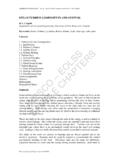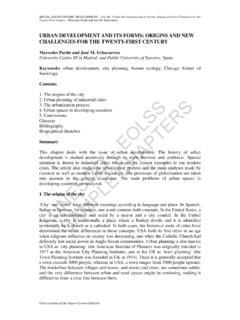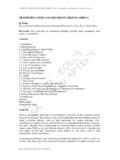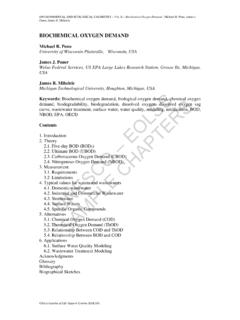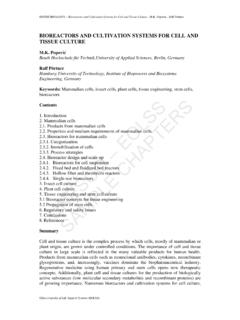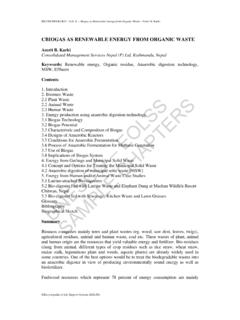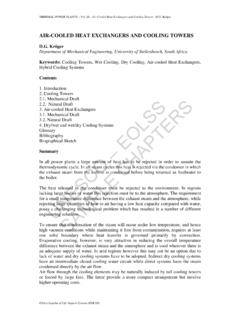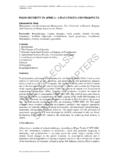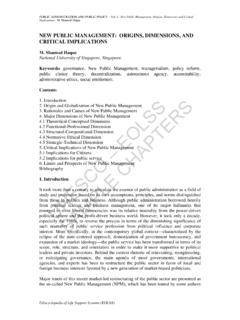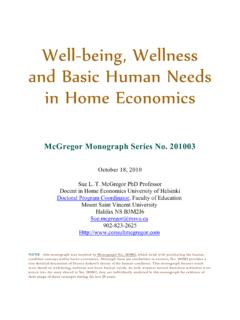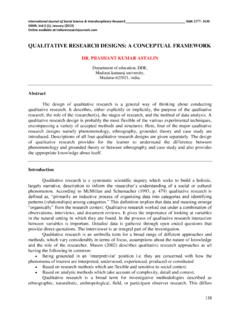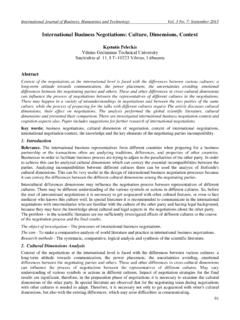Transcription of Theory and Methods in Geography - Encyclopedia …
1 UNESCO EOLSSSAMPLE CHAPTERSGEOGRAPHY Vol. I - Theory and Methods in Geography - Maria Sala Encyclopedia of life Support Systems(EOLSS) Theory AND Methods IN Geography Maria Sala Department of Physical Geography , University of Barcelona, Spain Keywords: Regional, systematic, naturalism, historicism, field work, sampling. Contents 1. Theories Introduction The Basic Scientific Principles The Main Conceptions in Human Geography The Regional Approach Systematic Studies The Coexistence of Naturalism and Historicism 2. Methods Methods Related to Scale About Fieldwork The structure of field research Field Sampling Examples of Geographical Field Research Teaching Based on Direct Observation Glossary Bibliography Biographical Sketch Summary Different methodological positions exist within geographical work, mainly related to the two main branches of the field, physical and human.
2 While in physical Geography the scientific, rational method used in natural sciences is the dominant one, in human Geography the historical, descriptive approach has been traditionally more common. This makes of Geography scientific field based on both inductive and deductive principles, and idiographic and nomothetic explanations. Regional Geography deals with the social and cultural construction of places, regions or territory, with the relationships that bind humans and society to environment. This approach is justified by the fact that things are different in different areas of the world.
3 In the systematic approach, the geographical study concentrates on a specific kind of phenomena irrespective of its location and applies the Methods of the natural sciences. Both proposals have shaped the geographical tradition. The contributions made by geographers to the development of techniques for observation, display and analysis of data are related to the practice of field research. This derives from the discipline's emphasis on location, distribution, spatial patterns and synthesis. For that reason, the principal laboratory for geographic investigation is the field.
4 Many of Geography 's most compelling questions centre on changes in the physical UNESCO EOLSSSAMPLE CHAPTERSGEOGRAPHY Vol. I - Theory and Methods in Geography - Maria Sala Encyclopedia of life Support Systems(EOLSS) and built landscape. Addressing those questions usually requires field observation and spatial sampling. 1. Theories Introduction Because Geography is a science of multiple approaches, being at the crossroad of various sciences, it takes Methods from many other associated fields. For the one side, it is located amongst the earth or natural sciences, from geology to meteorology and biology, and on the other side, amongst the social sciences, from history to economy and sociology.
5 It is for this reason that geographers are continuously discussing about the objectives, Methods and unity of Geography . However, the unity cannot be methodological because it uses the Methods of natural and social sciences. This variability of orientations makes it a science very sensible to conjectural issues in relation to the need of global knowledge inherent to social worries The Basic Scientific Principles As in all natural sciences, research in physical Geography follows the principles of rational science, that is, considers science as an ordered, logical activity, with judgments based on reasons, and has developed and progressed from the classical approach to the modern critical rationalism.
6 Classical, or empirical, science, issues from Francis Bacon in the sixteenth century, for whom the scientific knowledge is certain because it is based on observation, experience, and measurement. The experience provided by observation and experimentation is what distinguishes science from other sources of knowledge. The classical tradition asserts that knowledge grows by the patient accumulation of well-attested facts, on data perceived by the senses. A key element is the concept of induction, the process by which reliable generalizations are obtained from a set of observations of reality.
7 Induction generalizations are made once all the facts on a matter have been assembled. An example of the Methods of classical science is the work by Charles Darwin. In the twentieth century, the logical positivist accepted the view of the classical tradition but sought to give a more rigorous justification of this approach by trying to solve three problems: verification, induction and Theory -dependent observation. Verification, that is the gap between the reality that is experienced and the interpretation of it by the observer or scientist, who can never be certain that his senses are trustworthy and unprejudiced.
8 Induction or the fact that there is no principle that can justify the truth of a conclusion derived from a set of statements about a particular event, the justification of a universal statement on the basis of a set of particulars. The dependence of observation on Theory , because theoretical terms always enter into observational reports. UNESCO EOLSSSAMPLE CHAPTERSGEOGRAPHY Vol. I - Theory and Methods in Geography - Maria Sala Encyclopedia of life Support Systems(EOLSS) Figure 1. Inductive (Baconian) classical science. (simplified from Harvey) The critical rationalist view of Karl Popper is an important alternative to the classical tradition.
9 He argues that scientific method is essentially deductive in character, and that it is the ability to falsify scientific statements, rather than to verify them, which distinguishes scientific statements from all others. The term critical comes from the fact that scientific method is essentially critical in character. The term rationalism is used because such critical investigation is supposed to provide good, rational reasons for holding some theories rather than others. The main principles are those of falsification, criticism and demarcation.
10 The first principle indicates that universal statements and theories can only be refuted and not verified. In the second place, because all scientific knowledge is speculative and it grows by a process of trial and error rather than by accumulation of facts, the only rational attitude to adopt towards it is a critical one. Finally, the principle of demarcation asserts that the essential characteristic of scientific statements is that they are empirically testable and capable of refutation. UNESCO EOLSSSAMPLE CHAPTERSGEOGRAPHY Vol.
